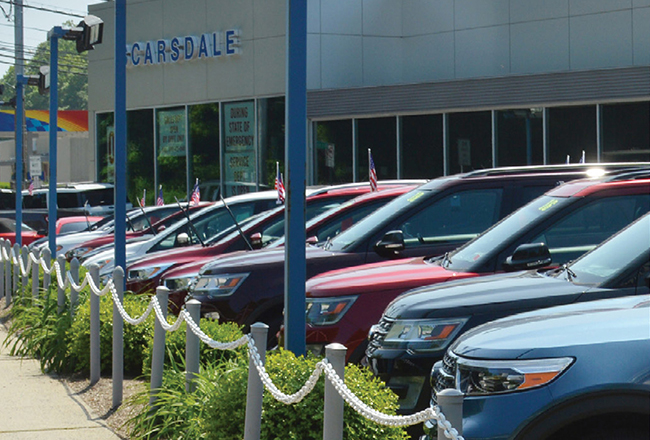Westchester”™s commercial real estate market has been particularly hard hit by the Covid-19 pandemic, with soaring vacancy rates exacerbated by concerns that the economy may or may not rebound in 2021.
But the Greater New York Automobile Dealers Association believes it has at least a partial solution: More auto dealerships.

Such businesses are the fifth-largest retail employer in the area, association President Mark Schienberg told the Business Journal.
“Big companies play a big role in the economy, of course,” Schienberg noted. “But there”™s nothing like small businesses, which year in and year out contribute to not just their local economies, but to their communities as well.”
According to the latest market report from Cushman & Wakefield, the overall vacancy rate in Westchester increased by 244 basis points (bps) to 25.1% in 2020. New leasing activity plummeted 38.4% from 2019 to an all-time low of 707,913 square feet ”” 42.4% below the five-year annual average of 1.2 million square feet.
And while Westchester”™s unemployment rate has rebounded from last July ”” it stood at 5.8% in November, compared with 14% in July ”” it is still a far cry from the 3.4% it recorded in November 2019.
But the auto dealers sector has done decidedly better. Although absent specific data about 2020, which is still being processed, Schienberg said the group”™s 425 members “ended up doing fairly well.
“It started off looking like we could lose a lot of our members when the pandemic hit,” he continued. “Business was off 85 to 86% right off the bat, and a lot of our members thought they might have enough capacity for a month or two before they”™d have to shut down.
“Their overhead can be very high,” Schienberg said, “with big buildings and lots, property taxes and the amount of money they pay to the manufacturers for inventory is very, very high as well.”
Gov. Andrew Cuomo, who initially shut down auto dealers when Covid-19 arrived, allowed dealers to sell and lease vehicles as long as they did so remotely as part of his March 26 executive order. Dealers were later allowed to sell in-person by appointment only, and today can sell or lease “the normal way,” Schienberg said.
Nevertheless, last month automotive information service Edmunds said it expected new vehicle sales to be down 15.5% in 2020; Cox Automotive predicted a 15.3% drop; and TrueCar anticipated a 15% decline. Sales also declined in 2019 on a year-over-year basis, but still topped 17 million for the fifth straight year.
But, as with the dealers association, analysts were saying the news was better than expected.
Positive spin vs. spinning of wheels
“Thinking back to the dire state of the market at the outset of the pandemic, it”™s such a testament to the incredible durability of the entire automotive industry ”” and the resilience of the American consumer ”” that we”™ve seen such a healthy rebound in new car purchases this year,” said Jessica Caldwell, Edmunds”™ executive director of insights. “A big comeback story of 2020 is without a doubt the recovery of retail vehicle sales, which have nearly returned to pre-pandemic levels.”
Schienberg said the region should expect better-than-anticipated results due to “a huge, pent-up demand for sales and servicing. There are a lot of first-time buyers in the market because they”™re concerned about public transportation like railroads and subways ”” and that”™s good for jobs and for tax revenue.”
While online sales, which have been commonly featured by most dealers for years, have increased during the pandemic, “if you need a car repaired, you can”™t do that digitally,” he noted. The association recorded over $9 million in vehicle repairs in 2019.
In the New York metro region, the group said, in 2019 its members contributed $53.4 billion to the economy; supported 72,200 employees (39,900 directly) ”” 5,984 in Westchester; and paid nearly $2.6 billion in tax revenue.
Armed with such data, Schienberg said that owners of property that has been vacated due to the pandemic ”” or, of course, before that ”” should consider car dealerships.
For the most part, he said, dealerships are not looking to downsize, and in many cases are looking to expand, making them ideal for leasing or buying and developing space.
Auto dealerships constantly invest in their spaces, often increasing the value of the property, he added: In 2019, dealerships in downstate New York spent $420 million on capital improvements, including remodeling indoor spaces, changing facades, upgrading infrastructure and expanding by adding new buildings on existing properties.
That increased property value also benefits the surrounding community, he said, with dealerships contributing $21 million to charitable causes as well as the aforementioned $2.6 billion in local and state tax revenues in 2019.
“As an association, we”™re always looking at return on investment,” Schienberg said. “We”™re in constant conversation with county and town executives and the governor”™s office to emphasize how good it is to have a car dealership around ”” they contribute so much, both financially and in terms of the community itself. And they have a physical presence that a lot of other retailers don”™t have, with the shift to online sales.”
Schienberg said he is remaining hopeful for 2021. “Business people are optimists at heart ”” if they weren”™t, they”™d probably get an office job someplace,” he said. “I think we”™re in for a decent year, depending on what happens in Washington (D.C.) and the toll the pandemic will continue to take on the economy.”
He noted that the annual New York International Auto Show, canceled last year, is scheduled to take place Aug. 20-29; it typically draws more than 1 million people to the Jacob Javits Convention Center.
“We”™re keeping our fingers crossed that enough vaccinations will take place that the show will go on,” Schienberg said.




















